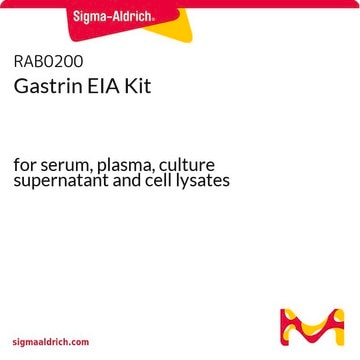G9020
Gastrin I human
≥95% (HPLC), powder
Sinónimos:
Gastrin I, heptadecapeptide, HG-17, Little gastrin I, human, [18-Pyroglutamic acid]big gastrin I-(18-34)-peptide amide, human, [pGlu18]-Big gastrin I fragment 18-34 amide
About This Item
Productos recomendados
biological source
human
Quality Level
assay
≥95% (HPLC)
form
powder
mol wt
2098.20
storage condition
(Keep container tightly closed in a dry and well-ventilated place)
concentration
≤100%
technique(s)
protein expression: suitable
solubility
water: 1.00-1.04 mg/mL, clear, colorless
UniProt accession no.
storage temp.
−20°C
SMILES string
CSCC[C@H](NC(=O)[C@H](Cc1c[nH]c2ccccc12)NC(=O)CNC(=O)[C@H](Cc3ccc(O)cc3)NC(=O)[C@H](C)NC(=O)[C@H](CCC(O)=O)NC(=O)[C@H](CCC(O)=O)NC(=O)[C@H](CCC(O)=O)NC(=O)[C@H](CCC(O)=O)NC(=O)[C@H](CCC(O)=O)NC(=O)[C@H](CC(C)C)NC(=O)[C@H](Cc4c[nH]c5ccccc45)NC(=O)[C@@H]6CCCN6C(=O)CNC(=O)[C@@H]7CCC(=O)N7)C(=O)N[C@@H](CC(O)=O)C(=O)N[C@@H](Cc8ccccc8)C(N)=O
InChI
1S/C97H124N20O31S/c1-49(2)39-68(114-95(146)71(43-54-46-100-59-18-11-9-16-57(54)59)116-97(148)73-19-12-37-117(73)76(121)48-102-85(136)60-24-30-74(119)104-60)93(144)110-65(29-35-81(130)131)91(142)109-64(28-34-80(128)129)90(141)108-63(27-33-79(126)127)89(140)107-62(26-32-78(124)125)88(139)106-61(25-31-77(122)123)87(138)103-50(3)84(135)113-69(41-52-20-22-55(118)23-21-52)86(137)101-47-75(120)105-70(42-53-45-99-58-17-10-8-15-56(53)58)94(145)111-66(36-38-149-4)92(143)115-72(44-82(132)133)96(147)112-67(83(98)134)40-51-13-6-5-7-14-51/h5-11,13-18,20-23,45-46,49-50,60-73,99-100,118H,12,19,24-44,47-48H2,1-4H3,(H2,98,134)(H,101,137)(H,102,136)(H,103,138)(H,104,119)(H,105,120)(H,106,139)(H,107,140)(H,108,141)(H,109,142)(H,110,144)(H,111,145)(H,112,147)(H,113,135)(H,114,146)(H,115,143)(H,116,148)(H,122,123)(H,124,125)(H,126,127)(H,128,129)(H,130,131)(H,132,133)/t50-,60-,61-,62-,63-,64-,65-,66-,67-,68-,69-,70-,71-,72-,73-/m0/s1
InChI key
GKDWRERMBNGKCZ-RNXBIMIWSA-N
Gene Information
human ... GAST(2520)
¿Está buscando productos similares? Visita Guía de comparación de productos
Amino Acid Sequence
General description
The GAST gene is mapped to human chromosome 17q21. Gastrin is a linear peptide. It is a gastrointestinal hormone, produced by G cells in the stomach.
Application
- to treat AGS stably transfected with gastrin receptor/cholecystokinin receptor 2 (CCK2R) (AGS-GR) cells to study the expression and secretion of clusterin (CLU) in human gastric cancer cells
- as a component of growth medium for culturing mouse normal esophageal epithelial organoid (mNEEO)
- as a supplement in basal culture media to use for organoid-like cultures
- as a molecular weight marker to calibrate superdex® 30 columns.
Biochem/physiol Actions
Other Notes
Legal Information
antibody
related product
Storage Class
11 - Combustible Solids
wgk_germany
WGK 3
flash_point_f
Not applicable
flash_point_c
Not applicable
ppe
Eyeshields, Gloves, type N95 (US)
Elija entre una de las versiones más recientes:
Certificados de análisis (COA)
¿No ve la versión correcta?
Si necesita una versión concreta, puede buscar un certificado específico por el número de lote.
¿Ya tiene este producto?
Encuentre la documentación para los productos que ha comprado recientemente en la Biblioteca de documentos.
Los clientes también vieron
Artículos
Organoid culture products to generate tissue and stem cell derived 3D brain, intestinal, gut, lung and cancer tumor organoid models.
Organoid culture products to generate tissue and stem cell derived 3D brain, intestinal, gut, lung and cancer tumor organoid models.
Organoid culture products to generate tissue and stem cell derived 3D brain, intestinal, gut, lung and cancer tumor organoid models.
Organoid culture products to generate tissue and stem cell derived 3D brain, intestinal, gut, lung and cancer tumor organoid models.
Nuestro equipo de científicos tiene experiencia en todas las áreas de investigación: Ciencias de la vida, Ciencia de los materiales, Síntesis química, Cromatografía, Analítica y muchas otras.
Póngase en contacto con el Servicio técnico![[Leu15]-Gastrin I human ≥95% (HPLC)](/deepweb/assets/sigmaaldrich/product/structures/153/342/d4cb3dd7-13f1-46cf-8d1f-3907a5de7a83/640/d4cb3dd7-13f1-46cf-8d1f-3907a5de7a83.png)










